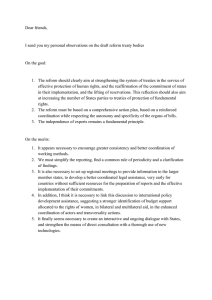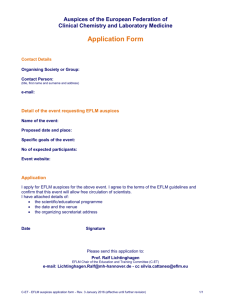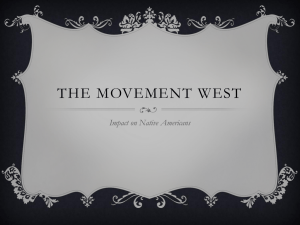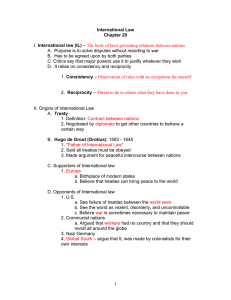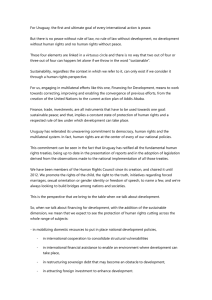QUESTION OF EXTENDED PARTICIPATION IN GENERAL
advertisement
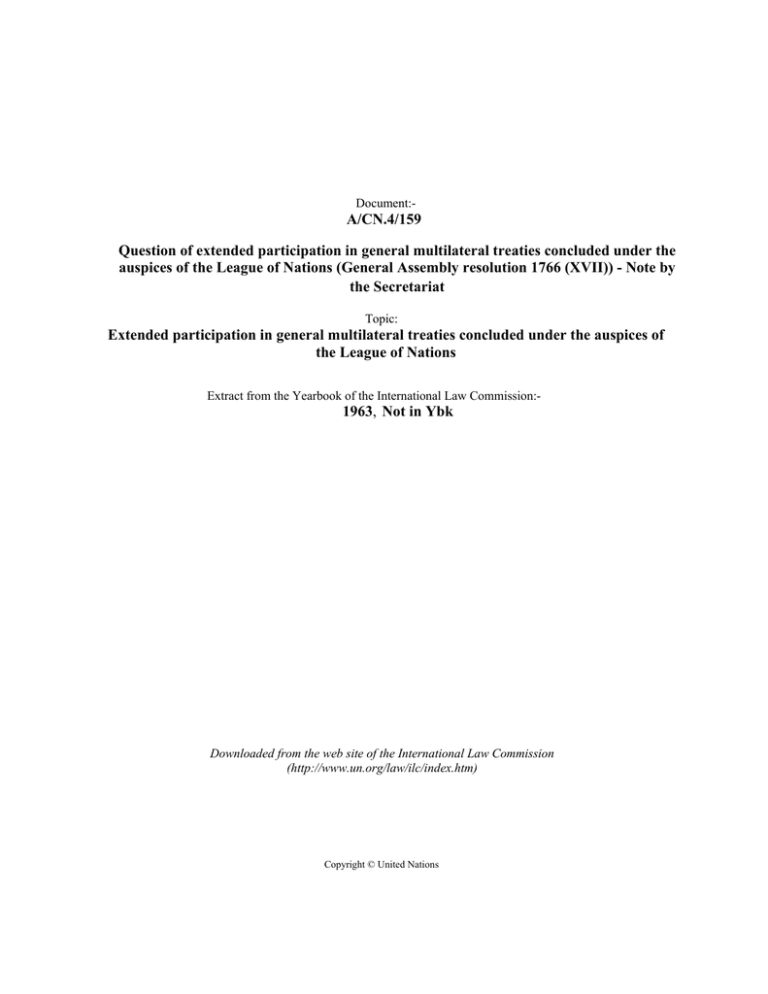
Document:- A/CN.4/159 Question of extended participation in general multilateral treaties concluded under the auspices of the League of Nations (General Assembly resolution 1766 (XVII)) - Note by the Secretariat Topic: Extended participation in general multilateral treaties concluded under the auspices of the League of Nations Extract from the Yearbook of the International Law Commission:- 1963, Not in Ybk Downloaded from the web site of the International Law Commission (http://www.un.org/law/ilc/index.htm) Copyright © United Nations UNITED NATIONS C^V GENERAL ASSEMBLY GENERAL 3 i¿ay 1963 £x II- LISE O r i g i n a l : ENGLISH/FRENCH/SPANISH INTERNATIONAL LAT COmToSIOK Fifteenth session Item 2 of the provisional agenda QUESTION OF EXTENDED PARTICIPATION IN GENERAL MULTILATERAL TREATIES CONCLUDED UNDER TEE AUSPICES OF THE LEAGUE OF NATIONS (General Assembly resolution 1766 (XVIl)) Note by the Secretariat 1. The question of extended participation in multilateral treaties concluded in the past and open to the participation of only certain categories of States was raised in the Sixth Committee at the seventeenth session of the General Assembly. The Sixth Committee began to study this question during its debate on the draft articles on the conclusion; entry into force and registration of treaties submitted by the International Law Commission;—draft article 9 of which deals with the "opening of a treaty to the participation of additional States". 2. The different views expressed and proposals made in connexion with this question are to be found in the fallowing passages of the report of the Sixth Committee to the General Assembly:-1^ 30. In accordance with the suggestion made by the International Law Commission in paragraph 10 of the Commentary on draft articles 8 and 9, it was agreed that since the sole purpose of the draft articles is to establish a general system for the future, it would be desirable to study separately the problems arising from treaties concluded in the past, and more particularly those concluded under the auspices of the League of Nations, since they constitute an important part of the contemporary international law of treaties. l/ Report of the International Law Commission covering the work of its fourteenth session, Official Records of the General Assembly, Seventeenth Session, Supplement No. 9 (A/5209), para. 23. 2/ Official Records of the General Assembly, Seventeenth Session, Annexes, agenda item 76, document A/5287 and Corr.lj paras. 30-39. GE.63-6740 A/CN.4/159 page 2 31. (A/C.6/L. A number of representatives submitted a draft resolution 504) which was not discussed in its original form, since a revise:1 text (A/C.6/L.504/Rev.1) was submitted before the debate on the question had started. This latter text proposed that the General Assembly should adoptf at its present session, a resolution authorizing certain measures so that the Secretary General of the United Nations could receive in deposit such instruments of acceptance to the conventions still in force and concluded under the auspices of the League of Nations as might be handed to him by any State Member of the United Nations or member of a specialized agency. 32. The draft resolution authorized the Secretary General to receive in deposit the instruments of acceptance of new States Members of the United Nations or members of a specialized agency, if the majority of the States Parties to those conventions had not objected, within a period of twelve months, to opening the conven úxui± o 1ͱ i¿Li¿o"úion tu accession. 33. The representatives who presented the proposal pointed out that the question was of interest to more than half of the States Members of the United Nations. Many representatives recognized the practical and immediate importance of the question, but expressed doubts regarding the proposed procedure as well as concerning some of the rules contained in it, 34. It was pointed outf for example, that the drafting of a formal protocol on the opening to accession of the aforementioned conventions, which would enter into effect when it liad been accepted by the number of parties regarded as necessary by the protocol itself, would be more in accordance with international practice and the domestic constitutional laws of many States. 35. It was also pointed out that the consent of the Parties should be expressed and not^ as proposed, in the form of a mere assumed tacit acquiescence. That suggestion was taken up by the sponsors of the proposal in a further revised version (A/e . ó/!;. 504/Rev. 2 ), in the part relating to the legal effects of the instruments of acceptance deposited. They explained that this was their intention in the part of the original proposal relating to the legal effects of the instruments of acceptance deposited. A/ON //I59 page 3 36. Several r-\ -r-SLsArxzi \: - „-£. 3 ^sin-í: :Í:/ restriction of the principle of universality by reserving thr procedure to be followed to specific categories of States, while excluding others- It was rcintod out that the use of the term "all States" in the subsequent revision of the draft resolution ¿A/C.6/L.50J+/Rev,2/ would affirm the principle of universality and would raise no difficulties for anyone - the draft -providing for the express consent of the parties to the convention - in the matter of the logal effects of the instruments of acceptance deposited. Every contracting State would thus be completely free to establish, or not to establish., treaty relations with any State wishing to accede to the convention or conventions in question. This interpretation was, however, rejected by one of the co-sponsors of the draft resolution. 37. The relationship between this proposal /A/C.6/L.5O4/Rev.2/ and the question of the succession of States aroused the concern of a number of representative In their view, the determination of the States now parties to the conventions in question involves a problem of the succession of States, since new States have been able to accede to old conventions under agreements made on their behalf by the States which formerly represented them In the international field. It was also pointed out that the proposal was meant to apply to situations in which there were no problems of succession of States. 38. With regard to the nature of the acceptance, some representatives felt that It should be made clear that such acceptances could not be accompanied by "reservations", since that was a practice which had been introduced since the conclusion of conventions under the auspices of the League of Nations. 39. Finally, most representativos considered that a more thorough study was needed of the possible Implications of the question, A number of representatives submitted a draft resolution (A/G.6/L.508;, which was subequently revised (A/C.6/L.5O8/Rev.l), requesting the International Law Commission to study the problem further -- with special reference to the debate In the General Assembly - and to Inform the General Assembly of the result of its studies in the report on the work of its fifteenth session, and requesting the Inclusion of the question on the agenda of the next session of the General Assembly, Although some representatives considered that the problem involved in the participation of new States in treaties concluded under the auspices of the League of Nations would be more appropriately resolved by the General Assembly and had doubts regarding the suitability of A/CN.4/159 page A referring the question to the International Law Commission, the Sixth Committee adopted the proposal contained in the draft resolution (A/e6/Lo508/Rev.l). 3. On the recommendation of the Sixth Committee, the General Assembly adopted, at its 1171st meeting, held on 20 November 1962, resolution 1766 (XVIl) on the question of extended participation in general multilateral treaties concluded under the auspices of the League of Nations» The text of this resolution is reproduced below" The General Assembly, Taking note of paragraph 10 of the commentary to articles 8 and 9 of the draft articles on the law of treaties contained in the report of the International Law Commission covering the work of its fourteenth session. Desiring to give further consideration to this question, 1° Requests the International Law Commission to study further the question of extended participation In general multilateral treaties concluded under the auspices of the League of Nations, giving dus consideration to the views expressed during the discussions at the seventeenth session of the General Assembly, and to include the results of the study in the report of the Commission covering the work of its fifteenth session'; 2- Decides to place on the provisional agenda of Its eighteenth session an item entitled "Question of extended participation In general multilateral treaties concluded under the auspices of the League of Nations".
